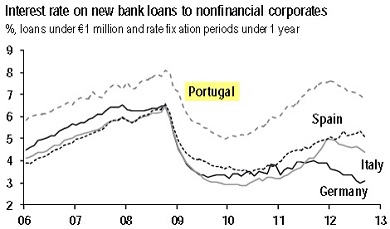The European Central Bank governor Mario Draghi has excluded Portugal from the Outright Market Transaction programme, that is the unlimited purchases of short-term sovereign bonds designed to lower credit costs. The reason is that the country now is under a national bailout and has no market access.
Draghi: “Portugal is an example of the significant progress that I have hinted at before, of the very, very significant progress that has been achieved. Moreover, the overall situation, politically speaking, is a strong situation. Obviously, we also fully share the concerns that have been expressed about the difficult social situation, but the reform agenda is firmly in place. The OMT would not apply to countries that are under a full adjustment programme until–and that is what I believe I said last time–full market access, complete market access has been obtained.”
“And this is because the OMT is not a replacement for a lack of primary market access. By the way, on this front, among several pieces of positive news that we have had in the last few days, we had one piece on Portugal, namely that, yesterday, for the first time, a three-year bond was issued, which is not complete market access, but it marks the beginning of complete market access, so that it is actually a reassuring bit of news.”
Draghi, as Trichet was before, demonstrate to what extent the central bank is under the control of the Bundesbank, which obeys to the interests of the German government.
Truth be told, Draghi has made a good effort to help salvage the euro. His OMT policy reset in June the interbank market and plugged again some entities that have been left without access. The mere announcement brought some calm. Yet, Portugal having no external credit access means nothing to him. His excuse not to intervene is totally absurd.
As readers can see, according to the above chart, the previous long-term refinancing operations of the ECB has done very little to channel internal credit to the private sector in Portugal and Spain. With his current attitude, Draghi signals that he is not prepared to do what it takes for the euro zone to recover its confidence.
If the only aim of Draghi is to fix the credit flows, though, this could be a good enough reason for Spain to ask for a bailout. But president Mariano Rajoy’s reluctance is more than understandable because there is no assurances about the reach of the OMT operations, nor their effects. Moreover, Brussels has recanted more than once, already.
The markets are betting that there will be a Spanish rescue, but unfortunately for investors, information is scarce and behind-the-stage rumours abound.






Be the first to comment on "Draghi cares little about Portugal, so would he really help Spain?"